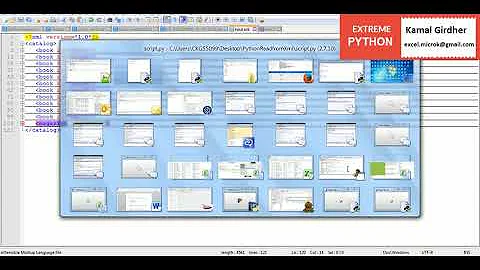Extract XML Value in bash script
Solution 1
As Charles Duffey has stated, XML parsers are best parsed with a proper XML parsing tools. For one time job the following should work.
grep -oPm1 "(?<=<title>)[^<]+"
Test:
$ echo "$data"
<item>
<title>15:54:57 - George:</title>
<description>Diane DeConn? You saw Diane DeConn!</description>
</item>
<item>
<title>15:55:17 - Jerry:</title>
<description>Something huh?</description>
$ title=$(grep -oPm1 "(?<=<title>)[^<]+" <<< "$data")
$ echo "$title"
15:54:57 - George:
Solution 2
XMLStarlet or another XPath engine is the correct tool for this job.
For instance, with data.xml containing the following:
<root>
<item>
<title>15:54:57 - George:</title>
<description>Diane DeConn? You saw Diane DeConn!</description>
</item>
<item>
<title>15:55:17 - Jerry:</title>
<description>Something huh?</description>
</item>
</root>
...you can extract only the first title with the following:
xmlstarlet sel -t -m '//title[1]' -v . -n <data.xml
Trying to use sed for this job is troublesome. For instance, the regex-based approaches won't work if the title has attributes; won't handle CDATA sections; won't correctly recognize namespace mappings; can't determine whether a portion of the XML documented is commented out; won't unescape attribute references (such as changing Brewster & Jobs to Brewster & Jobs), and so forth.
Solution 3
I agree with Charles Duffy that a proper XML parser is the right way to go.
But as to what's wrong with your sed command (or did you do it on purpose?).
-
$datawas not quoted, so$datais subject to shell's word splitting, filename expansion among other things. One of the consequences being that the spacing in the XML snippet is not preserved.
So given your specific XML structure, this modified sed command should work
title=$(sed -ne '/title/{s/.*<title>\(.*\)<\/title>.*/\1/p;q;}' <<< "$data")
Basically for the line that contains title, extract the text between the tags, then quit (so you don't extract the 2nd <title>)
Related videos on Youtube
Comments
-
Pete over 3 years
I'm trying to extract a value from an xml document that has been read into my script as a variable. The original variable, $data, is:
<item> <title>15:54:57 - George:</title> <description>Diane DeConn? You saw Diane DeConn!</description> </item> <item> <title>15:55:17 - Jerry:</title> <description>Something huh?</description> </item>and I wish to extract the first title value, so
15:54:57 - George:I've been using the sed command:
title=$(sed -n -e 's/.*<title>\(.*\)<\/title>.*/\1/p' <<< $data)but this only outputs the second title value:
15:55:17 - Jerry:Does anyone know what I have done wrong? Thanks!
-
Charles Duffy almost 11 yearsThe test data you gave is not a valid XML document. What does your real data look like?
-
Kevin almost 11 yearsNo-repro. I get both.
-
Charles Duffy almost 11 years...to be clearer about what I mean by "not a valid XML document" -- it has no root element, and its tags aren't all closed. This matters; an answer that's intended to handle invalid XML will be different from one that can assume legitimately compliant input.
-
-
Pete almost 11 yearsAh, perfect! Thanks heaps :)
-
jaypal singh almost 11 years
perlsolution would be:perl -ne 'print and last if s/.*<title>(.*)<\/title>.*/\1/;' <<< "$data"though as Charles Duffy suggested in comments, xml parsing is best done with xml parsers. This should be good for one off hacks. -
Pete almost 11 yearsThanks Charles, I wanted the script to be portable so I didn't think xmlstarlet would be best since I'd need to install the package on each system that I would want to use it on.
-
Charles Duffy almost 11 years@Pete This is a case where you need to decide between portability and correctness; you can't have both. The answer you accepted will give demonstrably wrong output in some common situations (and a very large number of uncommon ones).
-
JorgeeFG over 10 yearsGood tool, a little complicated to use but after 30 min of
manand testing I got what I needed. thanks! -
Jonas Bang Christensen over 10 yearsThanks a lot. I tried a bunch of
sedcommands, and eventually got it to work, but then it turned out that it worked differently in different terminals >sigh<. So,grepto the rescue :o) I extended it a bitgrep -oPm1 "(?<=<version>)REL.P*[^</version>]+" pom.xml. This means: Give me the string between<version>and</version>which begins withREL.P, e.g.REL.P.02.03.04. -
ooxi about 10 yearsTelling people to use regular expressions for a clearly non regular language is doomed and should not be the accepted answer
-
jaypal singh about 10 years@ooxi Thanks for leaving a comment. I won't argue with your down vote as I do agree with you. I never this is the only way. In fact I did state in my comments that xml parsers should be used. However for one time job I don't expect anyone to learn an xml parser. Clearly it worked out for OP.
-
Charles Duffy about 10 years@JonasBang, perhaps you mean
REL[.]P.*?REL.P*is something quite different. -
ooxi about 10 years@jaypal You are right it would do for a one time job like OP has posted. But since this post is in the top results in google when searching for this topic and thus people will start copy pasting the accepted solution I would be more comfortable with a correct answer which scales beyond the question of OP
-
jaypal singh about 10 years@ooxi Agreed. I updated the answer to issue a warning and embedded a link to the answer from Charles.
-
kjhughes over 9 yearsI added a semicolon after 'q' in sed command. This still works with Linux distros and resolves issue on MacOS where error otherwise occurs: "extra characters at the end of q command"
-
user3589608 about 2 yearsThere is no "-P" option for grep on Mac. It does work on Linux (tested on Ubuntu 20.04 LTS and Debian 11). Upvoted the "sed" solution from doubleDown below, because it works on both.
-
user3589608 about 2 yearsThank you! Needed this to work on both, Mac and Linux. And your solution fit the bill. Top-rated solution from @jaypal singh did not work for me, because there is no "-P" option for grep on MAC.







